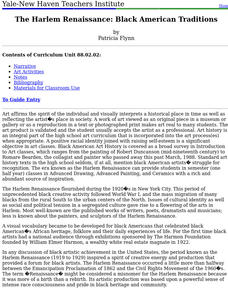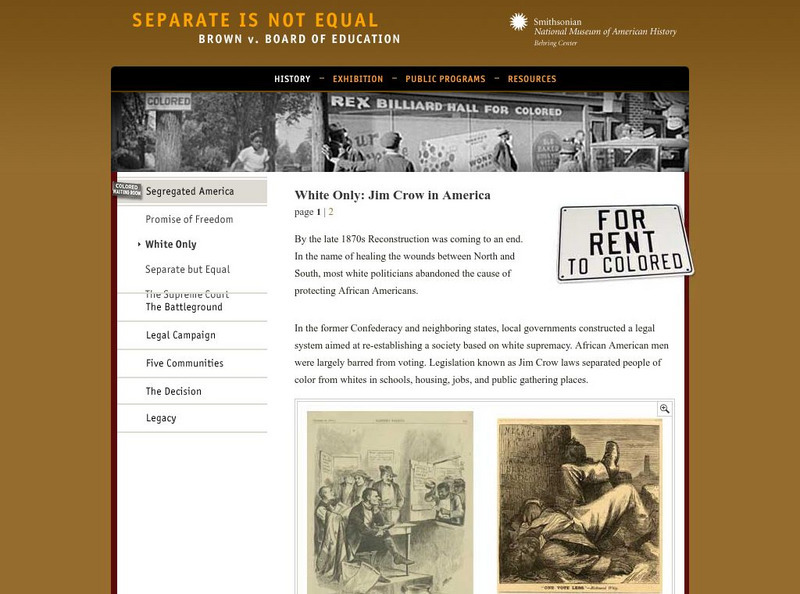Yale University
The Harlem Renaissance: Black American Traditions
Aaron Douglas, Meta Warrick Fuller, Palmer Hayden, William Johnson, and James Lesesne Wells, the painters and sculptors of the Harlem Renaissance, are featured in a unit study of artists of the Harlem Renaissance.
Curated OER
Sporting Tolerance
Students investigate African-American baseball players from the early 20th century. They read an article, answer discussion questions, write a journal entry, and create a poster-size baseball card for an athlete.
Curated OER
Lesson 2-Profiles in Courage: To Kill A Mockingbird and the Scottsboro Boys Trial
Review one of the most memorable cases in the history of the United States. After reading To Kill A Mockingbird, young scholars read and select court transcripts and other primary source material from the Scottsboro Boys Trial of 1933....
Curated OER
The Piano
Second graders read The Piano and become familiar with racial discrimination. In this racial discrimination book lesson, 2nd graders answer comprehension question to focus on the importance of the book. Students discuss the reader's...
Curated OER
Rosa Parks Autobiography
Students write the story of Rosa Parks from the perspective of someone who was sitting on the bus that day. In this Rosa Parks/biography lesson, students read the story of Rosa Parks and discuss it in small groups. After each group...
Curated OER
Dear Mrs. Parks Teacher's Guide
Students read and respond to the book, Dear Mrs. Parks. In this African-American literature lesson, students read the text and examine several vocabulary words from the text. Students answer 11 discussion questions and participate in...
Curated OER
Civil Rights Heroes
Students explore the actions of people involved in the Civil Rights Movement. They explore the reasons for the movement and its successes and failures, and explain the sacrifices made by those who participated in the movement.
Curated OER
Latinos and the Fourteenth Amendment: A Primary Source Document Activity
Eighth graders explore the effect of the Fourteenth Amendment. In this US History lesson, 8th graders read and analyze primary source documents. Students write a three minute paper demonstrating their understanding of the fourteenth...
Curated OER
The Power of Protest
High schoolers explain how Rosa Parks refused to give up her bus seat to a white man. They discuss how her actions were heroic and how they affected the civil rights movement. They reflect on the lesson in journal entries.
PBS
Pbs: L. Hansberry: A Raisin in the Sun: Jim Crow, Home Ownership, American Dream
Learn how Jim Crow laws impacted home ownership and the pursuit of the American Dream in this series of videos from the American Masters film, Lorraine Hansberry: Sighted Eyes/Feeling Heart. Lorraine Hansberry's family was at the...
Smithsonian Institution
National Museum of American History: Separate Is Not Equal: Jim Crow Laws
Find Jim Crow laws, see signs, and read restrictive covenants that restricted freedom of movement, housing, and use of public facilities by African Americans in the late 19th and 20 centuries.
PBS
Pbs: Jazz Is About Collaboration: Jim Crow Laws: Segregation
Engage your students in discussion about segregation and the Jim Crow laws with this in-depth lesson plan. Using jazz music, you will contrast the ways in which America's most significant contribution to the arts depended on...
Other
Jim Crow Museum of Racist Memorabilia: What Was Jim Crow?
A listing of the Jim Crow laws and understood Jim Crow etiquette found across the South in the late 19th century.
PBS
Wnet: Thirteen: The Rise and Fall of Jim Crow
Companion to a four-part PBS series about Jim Crow has a timeline with links to significant events and people, video and audio clips from the series, and in-depth backgrounders on Jim Crow issues and impacts.
Library of Congress
Loc: Civil Rights Jim Crow in America
A collection of primary source materials that reflect the Jim Crow laws in the United States. Includes analysis tools and teacher guides.
Khan Academy
Khan Academy: Ap Us History: 1865 1898: The South After the Civil War: Jim Crow
Explains how Jim Crow laws came to be created in the South and what it meant for African Americans. Discusses the Plessy v. Ferguson Supreme Court case, how its decision was eventually overturned, and the events that brought an end to...
Constitutional Rights Foundation
Constitutional Rights Foundation: A Brief History of Jim Crow
Article provides an overview of the history of Jim Crow laws and questions for discussion.
Siteseen
Siteseen: American Historama: Jim Crow Laws
Learn about the Jim Crow Laws, Southern laws that legalized segregation.
PBS
Wnet: Thirteen: Rise and Fall of Jim Crow: A National Struggle: Congress
This two-page segment of a larger PBS site about Jim Crow discusses the role of Congress over close to 100 years in first entrenching Jim Crow laws in the law of the land, and eventually, through the Civil Rights Act of 1965 and the...
Ducksters
Ducksters: Civil Rights for Kids: Jim Crow Laws
On this site,students learn about the history of Jim Crow Laws including segregation in the South, example laws, grandfather clauses, black codes, and how they got the name Jim Crow.
iCivics
I Civics: Jim Crow
Use primary documents and images to discover the ways state and local governments restricted the newly gained freedoms of African Americans after the Civil War. Compare, contrast, and analyze post-war legislation, court decisions...
Other
Amistad Digital Resource: Jim Crow
This article explores the Jim Crow system of racial exploitation which was a way of regimenting segregation in both political and cultural relations.
Smithsonian Institution
National Museum of American History: Separate Is Not Equal: White Only
This section from the Smithsonian Institution's National Museum of American History's exhibition Separate Is Not Equal: Brown v. Board of Education gives the history of Jim Crow laws and how they affected not only the voting rights of...
Khan Academy
Khan Academy: Us History: 1865 1898: Jim Crow
After Reconstruction, states in the South passed laws that barred African Americans from voting and segregated schools, restaurants, and public accommodations.























